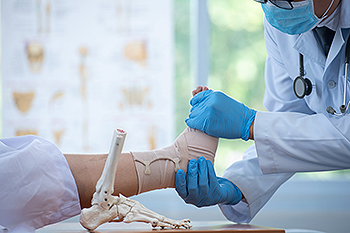Items filtered by date: September 2024
Why Live with Pain and Numbness in Your Feet?
Bunion Surgery Procedures

Bunion surgery is designed to alleviate pain and correct the misalignment caused by bunions. The procedure may involve several techniques depending on the severity and specific characteristics of the bunion. Exostectomy is the removal of the bony bump, while osteotomy realigns the bones of the toe to correct its position. Arthrodesis, or fusion surgery, involves joining two bones in the toe to stabilize the joint and reduce pain. Resection arthroplasty removes the damaged joint and reshapes the bones to improve function. Post-surgery, you can expect a recovery period involving rest, wearing special footwear, and gradual rehabilitation exercises. If you have a bunion that is causing discomfort, it is suggested that you consult a podiatrist who can determine if surgery is right for you.
Foot surgery is sometimes necessary to treat a foot ailment. To learn more, contact the foot specialists of Podiatry Associates of Belleville. Our doctors will assist you with all of your foot and ankle needs.
When Is Surgery Necessary?
Foot and ankle surgery is generally reserved for cases in which less invasive, conservative procedures have failed to alleviate the problem. Some of the cases in which surgery may be necessary include:
- Removing foot deformities like bunions and bone spurs
- Severe arthritis that has caused bone issues
- Cosmetic reconstruction
What Types of Surgery Are There?
The type of surgery you receive will depend on the nature of the problem you have. Some of the possible surgeries include:
- Bunionectomy for painful bunions
- Surgical fusion for realignment of bones
- Neuropathy decompression surgery to treat nerve damage
Benefits of Surgery
Although surgery is usually a last resort, it can provide more complete pain relief compared to non-surgical methods and may allow you to finally resume full activity.
Surgical techniques have also become increasingly sophisticated. Techniques like endoscopic surgery allow for smaller incisions and faster recovery times.
If you have any questions please feel free to contact our office located in Belleville, NJ . We offer the newest diagnostic and treatment technologies for all your foot and ankle needs.
Facts About Ankle Fractures

Ankle fractures occur when one or more of the bones in the ankle are broken, typically involving the tibia, fibula, and talus. The tibia and fibula are the main weight-bearing bones of the lower leg, while the talus sits between them and the heel bone, forming the ankle joint. Causes of broken ankles include trauma from falls, sports injuries, or accidents, as well as severe twisting or rolling of the ankle. Symptoms include sharp pain, significant swelling, bruising, and difficulty in bearing weight. The ankle may appear deformed or misaligned. Prompt medical evaluation is essential for proper diagnosis and treatment, which may involve immobilization, casting, or surgery depending on the severity of the fracture. If you have sustained an ankle fracture, it is suggested that you consult a podiatrist.
Broken ankles need immediate treatment. If you are seeking treatment, contact the foot specialists from Podiatry Associates of Belleville. Our doctors can provide the care you need to keep you pain-free and on your feet.
Broken Ankles
A broken ankle is experienced when a person fractures their tibia or fibula in the lower leg and ankle area. Both of these bones are attached at the bottom of the leg and combine to form what we know to be our ankle.
When a physician is referring to a break of the ankle, he or she is usually referring to a break in the area where the tibia and fibula are joined to create our ankle joint. Ankles are more prone to fractures because the ankle is an area that suffers a lot of pressure and stress. There are some obvious signs when a person experiences a fractured ankle, and the following symptoms may be present.
Symptoms of a Fractured Ankle
- Excessive pain when the area is touched or when any pressure is placed on the ankle
- Swelling around the area
- Bruising of the area
- Area appears to be deformed
If you suspect an ankle fracture, it is recommended to seek treatment as soon as possible. The sooner you have your podiatrist diagnose the fracture, the quicker you’ll be on the way towards recovery.
If you have any questions, please feel free to contact our office located in Belleville, NJ . We offer the newest diagnostic and treatment technologies for all your foot care needs.
The Basics of Broken Toes

A broken toe, or toe fracture, occurs when one of the bones in the toe is cracked or shattered due to trauma, such as stubbing the toe or dropping a heavy object on it. Symptoms of a broken toe include severe pain, swelling, bruising, and difficulty moving the toe. In some cases, the toe may appear deformed or out of alignment. Treatment for a broken toe typically involves rest and immobilization to allow the bone to heal properly. This often includes buddy-taping the injured toe to the adjacent toe for support and using a stiff-soled shoe to protect the area. Elevation can help reduce swelling and pain. In more severe cases, where the toe is displaced or has multiple fractures, a splint or surgery might be required. For an accurate diagnosis and appropriate treatment plan for a broken toe, it’s suggested you make an appointment with a podiatrist.
A broken toe can be very painful and lead to complications if not properly fixed. If you have any concerns about your feet, contact the foot specialists from Podiatry Associates of Belleville. Our doctors will treat your foot and ankle needs.
What to Know About a Broken Toe
Although most people try to avoid foot trauma such as banging, stubbing, or dropping heavy objects on their feet, the unfortunate fact is that it is a common occurrence. Given the fact that toes are positioned in front of the feet, they typically sustain the brunt of such trauma. When trauma occurs to a toe, the result can be a painful break (fracture).
Symptoms of a Broken Toe
- Throbbing pain
- Swelling
- Bruising on the skin and toenail
- The inability to move the toe
- Toe appears crooked or disfigured
- Tingling or numbness in the toe
Generally, it is best to stay off of the injured toe with the affected foot elevated.
Severe toe fractures may be treated with a splint, cast, and in some cases, minor surgery. Due to its position and the pressure it endures with daily activity, future complications can occur if the big toe is not properly treated.
If you have any questions please feel free to contact our office located in Belleville, NJ . We offer the newest diagnostic and treatment technologies for all your foot and ankle needs.
The Connection Between Foot Pain and Hypothyroidism

Foot pain can often be a hidden symptom of hypothyroidism, a condition where the thyroid gland does not produce enough hormones. Hypothyroidism can lead to various complications, including peripheral neuropathy and fluid retention, both of which contribute to foot discomfort. Poorly controlled thyroid levels can cause nerve damage, resulting in tingling, numbness, or pain in the feet. Additionally, hypothyroidism often leads to fluid retention, causing swelling in the feet and ankles, which can increase foot pain. The reduced metabolic rate associated with thyroid dysfunction can also affect muscle strength and joint health, further contributing to foot issues. If you have a thyroid condition and are experiencing foot pain, it is suggested that you consult a podiatrist who can treat various foot ailments, in addition to determining if it is linked to thyroid disease.
When dealing with systemic disease of the feet, it is extremely important to check the affected areas routinely so that any additional problems are caught quickly. If you have any concerns about your feet and ankles contact the foot specialists from Podiatry Associates of Belleville. Our doctors will assist you with all of your podiatric needs.
Systemic Diseases of the Feet
Systemic diseases affect the whole body, and symptoms usually are displayed in the feet. This condition can make a patient’s ability to walk unbearable. Systemic diseases include gout, diabetes mellitus, neurological disorders, and arthritis.
Gout – is caused by an excess of uric acid in the body. Common symptoms include pain, inflammation, and redness at the metatarsal/phalangeal joint of the base big toe. Gout can be treated by NSAIDs to relieve pain and inflammation, and other drugs that lower the acid levels in the body.
Diabetes mellitus – is an increase in the level of blood sugar that the body cannot counteract with its own insulin. Failure to produce enough insulin is a factor in Diabetes.
Diabetes of the Feet
Diabetic Neuropathy – may lead to damaged nerves and affect the feet through numbness and loss of sensation.
Peripheral Vascular Disease – can restrict the blood flow to the feet, and often times lead to amputation of the feet.
If you have any questions please feel free to contact our office located in Belleville, NJ . We offer the newest diagnostic and treatment technologies for all your foot and ankle needs.
